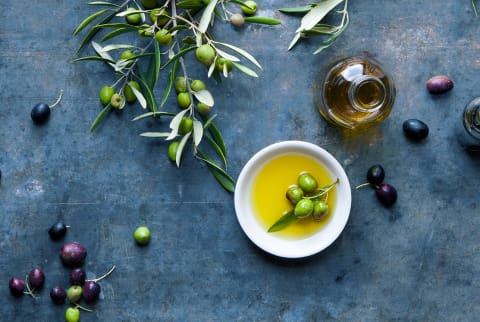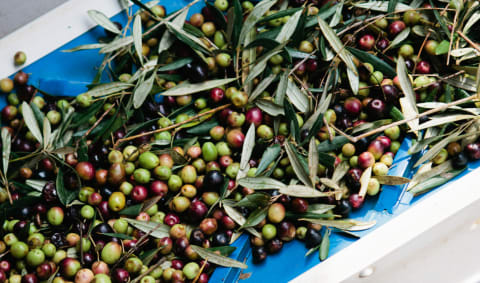Advertisement
This 3-Second Trick Lets You Know If Your Olive Oil Is Real & Full Of Health Benefits



You've likely heard the news: More than 69 percent of the extra-virgin olive oil available at the supermarket is not, in fact, extra virgin. In fact, much of it isn't olive oil at all: Many companies use soybean or sunflower oil as cheaper alternatives to olive oil, so they can turn a greater profit.
The problem? Even if you know that it's hard to procure true olive oil, it can be hard to figure out how to actually find the stuff. Yes, you can visit your local farmers market and chat with the person actually cultivating the trees (and we always recommend that), but for many of us, that option simply isn't available. You can also send your favorite brand off to a lab, where they'll test its compounds—but that's expensive and, again, rather inaccessible.
Luckily, there's a simple trick that will help you figure out if your favorite brand is the real thing or not, and all you need is your mouth and a small glass. Here, olive oil sommelier (yes, that's a real thing) Katerina Mountanos shares her exact method:
- "Pour a shot of your olive oil into a small, preferably round glass. (A wine tumbler or short cocktail glass works best.)
- Cup the glass with one hand and cover the top with the other. We cover the top to trap the scent inside.
- Twist the glass in your hand to attempt to warm the oil with your body heat and move it around in a circular motion.
- Now, uncover the glass and bring to your nose for a deep whiff of the olive oil. If it smells fresh like grass, fruit, or vegetables, it’s more likely that your oil is truly extra virgin. Common identifiable scents from truly premium olive oil are grass, green or red tomato, banana, arugula, spinach, apple, citrus, or almond. If you’re not getting much of a fresh scent, it’s likely not extra virgin. Anything that smells musty, rancid, or is odorless is not extra-virgin oil.
- The next step is to actually taste it. Give the glass a swirl and take a sip of the oil in your mouth but don’t swallow just yet. With clenched teeth and open lips, inhale to bring some air into your mouth and swirl the oil around your mouth. Then drink it. A true extra virgin will reveal lots of fruit and vegetable flavors as you swirl it around your mouth and will have a peppery or bitter taste at the back of your throat when you swallow it. It’s normal to cough, and in fact, premium olive oils are often characterized as one-cough, two-cough or three-cough oil. The more coughing, the more the polyphenols and the better the oil!"

The simplest takeaway? If you don't cough—or at least have a tickle in your throat—it's likely your oil isn't high-quality (or even olive oil at all!).
The simplest takeaway? If you don't cough—or at least have a tickle in your throat—it's likely your oil either is based in a different type or utilizing lower-quality olive oil, typically derived from older batches that have lost many of their health benefits (at best) or gone rancid (at the worst). When an oil goes rancid, it oxidizes. You know how the health world glorifies antioxidants? Oxidized food is the opposite of that—meaning, yes, your olive oil could be hurting your health more than helping.
You can try out the technique with your olive oil of choice, or purchase one of these brands, which we've verified:
- Kosterina Extra-Virgin Olive Oil (Katerina's own brand, which has the most robust taste of any we've tried)
- Lucini Olive Oil (this one is available at Costco!)
- Sciabica Olive Oil (grown from California olives, this has less of a carbon footprint from transport. It's also the oldest olive oil in America!)
While it's not in the spotlight as much as trendier oils like avocado and coconut, olive oil still has a ton of health benefits—here's a quick refresher.

Why Nutrition Is Key To Changing Your Relationship With Alcohol
Brooke Scheller, DCN, CNS

Why Alcohol Sabotages Your Gut Health & How To Get Back On Track
Brooke Scheller, DCN, CNS

Why Nutrition Is Key To Changing Your Relationship With Alcohol
Brooke Scheller, DCN, CNS

Why Alcohol Sabotages Your Gut Health & How To Get Back On Track
Brooke Scheller, DCN, CNS

Why Nutrition Is Key To Changing Your Relationship With Alcohol
Brooke Scheller, DCN, CNS

Why Alcohol Sabotages Your Gut Health & How To Get Back On Track
Brooke Scheller, DCN, CNS

Why Nutrition Is Key To Changing Your Relationship With Alcohol
Brooke Scheller, DCN, CNS

Why Alcohol Sabotages Your Gut Health & How To Get Back On Track
Brooke Scheller, DCN, CNS














